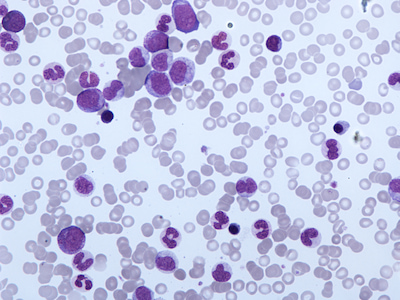PBAC update on new MDS & CMML treatment
The Leukaemia Foundation provided consumer comments to the Pharmaceutical Benefits Advisory Committee (PBAC) in relation to Otsuka Australia Pharmaceutical’s resubmission for decitabine and cedazuridine (Inqovi®) for high-risk MDS and CMML.

The resubmission will be considered by the PBAC at its July 2021 meeting. The Leukaemia Foundation provided consumer comments which included feedback from three patients with CMML or MDS who have undergone treatment with azacitidine, and one from a carer of a person with MDS. These comments included:
“I hate the azacitadine injections, and hope to keep hating them for years to come! …Without knowing all about the oral regime, it sounds much more travel-friendly than the sub-cutaneous injections, which currently involves me feeling unwell for 12-14 days, and anchor me to an oncology unit, and trained injecting staff.”
“It’s extremely tiring and the treatment also takes a lot out of you. There is constant fatigue issues. Unfortunately some of the treatments are not particularly nice. I am currently doing azacitadine and have just completed cycle 11 and probably the fatigue I feel from this cycle is the worst.”
“My husband has been diagnosed with MDS. It is very difficult to cope with the situation our ability to work/our career is very much disturbed… Treatments of orally in tablet form over 5 days and can be taken from home would be great if it the same benefits as current subcutaneous injections. If he didn’t have to travel for his current treatment he would be able to rest, no need to request for travel arrangements, no need to bother about parking arrangements. It would save my time also and less stress than going to the appointment to get the injections which is very painful.”
The PBAC had considered decitabine and cedazuridine at its March 2021 meeting and the decision was to ‘not recommend’.
The PBAC said it acknowledged the advantages of decitabine and cedazuridine being an oral treatment, in particular for patients living in rural and remote areas, whereas the current standard of care, azacitidine, is administered subcutaneously or intravenously and requires attendance at an outpatient clinic for seven days each month.
However, the PBAC considered the claims of non-inferior effectiveness and safety compared with azacitidine to be uncertain. The PBAC considered that this uncertainty also impacted on the reliability of the cost minimisation analysis presented in the submission.
In response to this decision, the sponsor, Otsuka Australia, said the company was committed to working with the PBAC and the Department of Health to find a way to make this important treatment accessible to patients in Australia.
In its consumer comments for the submission at the PBAC’s upcoming July meeting, the Leukaemia Foundation reiterated that the unmet need for people suffering MDS, in particular, and rare blood cancers more broadly, including CMML, is extremely high.
“There are few suitable and palatable treatment options. Improving access for more and better treatment options for these people should be a high priority for the PBAC.”
Last updated on June 8th, 2022
Developed by the Leukaemia Foundation in consultation with people living with a blood cancer, Leukaemia Foundation support staff, haematology nursing staff and/or Australian clinical haematologists. This content is provided for information purposes only and we urge you to always seek advice from a registered health care professional for diagnosis, treatment and answers to your medical questions, including the suitability of a particular therapy, service, product or treatment in your circumstances. The Leukaemia Foundation shall not bear any liability for any person relying on the materials contained on this website.